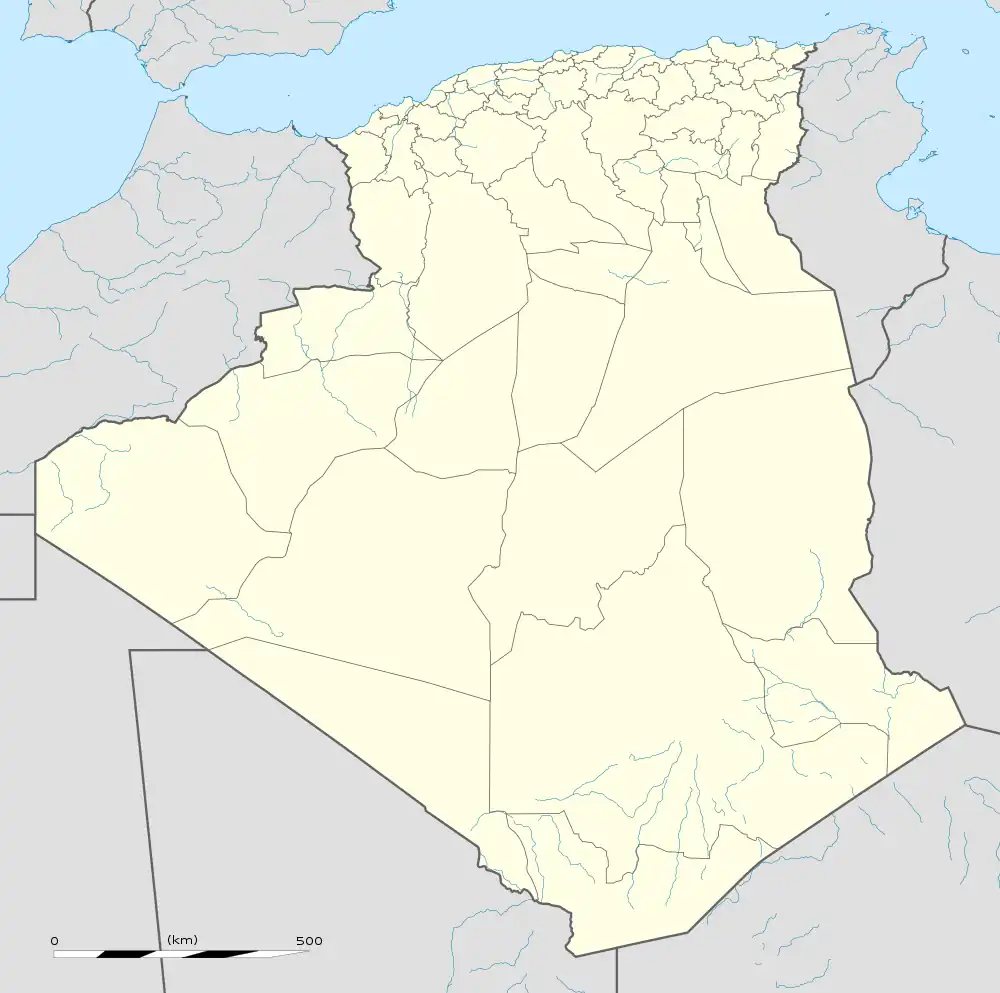Ouled Aissa, Adrar
Ouled Aissa (Arabic: اﻟﻄﺎرﻓﺔ) (also written Ouled Aïssa) is a town and commune in Charouine District, Adrar Province, in south-central Algeria. According to the 2008 census it has a population of 7,034,[1] up from 5,497 in 1998,[2] with an annual growth rate of 2.5%.[1]
Ouled Aissa
وﻻد ﻋﻴﺴﻰ | |
|---|---|
Town and commune | |
_location_map.svg.png.webp) Location of Ouled Aissa commune within Adrar Province | |
 Ouled Aissa Location of Ouled Aissa within Algeria | |
| Coordinates: 29°25′30″N 0°5′21″W | |
| Country | Algeria |
| Province | Adrar |
| District | Charouine |
| Area | |
| • Total | 4,030 km2 (1,560 sq mi) |
| Elevation | 356 m (1,168 ft) |
| Population (2008)[1] | |
| • Total | 7,034 |
| Time zone | UTC+1 (CET) |
Geography
Ouled Aissa commune lies at an elevation of about 356 metres (1,168 ft) in the Gourara region of northern Adrar Province. The commune consists of several villages (including the town of Ouled Aissa) that populate small oases between Talmine commune to the west and Ksar Kaddour and Ouled Said communes to the east. The oases mainly lie at the northern edge of the habitable Gourara region just south of the Grand Erg Occidental, a large area of sand dunes stretching well into Béchar and El Bayadh provinces.
Climate
Ouled Aissa has a hot desert climate (Köppen climate classification BWh), with extremely hot summers and mild winters, and very little precipitation throughout the year.
| Climate data for Ouled Aissa | |||||||||||||
|---|---|---|---|---|---|---|---|---|---|---|---|---|---|
| Month | Jan | Feb | Mar | Apr | May | Jun | Jul | Aug | Sep | Oct | Nov | Dec | Year |
| Average high °C (°F) | 18.7 (65.7) |
21.6 (70.9) |
26.4 (79.5) |
31.5 (88.7) |
35.5 (95.9) |
41.5 (106.7) |
44.9 (112.8) |
43.7 (110.7) |
39.1 (102.4) |
31.8 (89.2) |
24.3 (75.7) |
19.3 (66.7) |
31.5 (88.7) |
| Daily mean °C (°F) | 11.4 (52.5) |
14.0 (57.2) |
18.4 (65.1) |
23.4 (74.1) |
27.4 (81.3) |
32.9 (91.2) |
36.3 (97.3) |
35.4 (95.7) |
31.3 (88.3) |
24.6 (76.3) |
17.5 (63.5) |
12.5 (54.5) |
23.8 (74.7) |
| Average low °C (°F) | 4.2 (39.6) |
6.5 (43.7) |
10.5 (50.9) |
15.3 (59.5) |
19.3 (66.7) |
24.4 (75.9) |
27.7 (81.9) |
27.1 (80.8) |
23.6 (74.5) |
17.4 (63.3) |
10.8 (51.4) |
5.8 (42.4) |
16.1 (60.9) |
| Average precipitation mm (inches) | 1 (0.0) |
3 (0.1) |
4 (0.2) |
1 (0.0) |
1 (0.0) |
0 (0) |
0 (0) |
1 (0.0) |
1 (0.0) |
3 (0.1) |
3 (0.1) |
2 (0.1) |
20 (0.6) |
| Source: climate-data.org[3] | |||||||||||||
Transportation
The main road through the commune is a provincial road that starts at the village of Taouennza, passes through Haiha, Yako and Ouled Aissa town before connecting to the N51 national highway northeast of Charouine. A local road branches off south of Ouled Aissa town connecting to Djimjane.
Education
3.2% of the population has a tertiary education, and another 7.3% has completed secondary education.[4] The overall literacy rate is 63.7%, and is 81.0% among males and 45.5% among females.[5]
Localities
As of 1984, the commune was composed of nine localities:[6]
- Ouled Aïssa
- Tasfaout
- Guentour
- Djimjane
- Taouennza
- Haïha
- Yako
- El Kort
- Lahmer
References
- "Population: Wilaya d'Adrar" (PDF) (in French). Office National des Statistiques Algérie. Retrieved 1 July 2013.
- "Algeria Communes". Statoids. Retrieved 8 March 2013.
- "Climate data for: Ouled Aissa". climate-data.org. Retrieved 7 August 2013.
- "Structure relative de la population résidente des ménages ordinaires et collectifs âgée de 6 ans et plus selon le niveau d'instruction et la commune de résidence" (PDF) (in French). Office National des Statistiques Algérie. Retrieved 1 July 2013.
- "Taux d'analphabétisme et taux d'alphabétisation de la population âgée de 15 ans et plus, selon le sexe et la commune de résidence " (PDF) (in French). Office National des Statistiques Algérie. Retrieved 1 July 2013.
- "Décret n° 84-365, fixant la composition, la consistance et les limites territoriale des communes. Wilaya d'Adrar" (PDF) (in French). Journal officiel de la République Algérienne. 19 December 1984. p. 1473. Archived from the original (PDF) on 2012-01-15. Retrieved 1 July 2013.
.svg.png.webp)